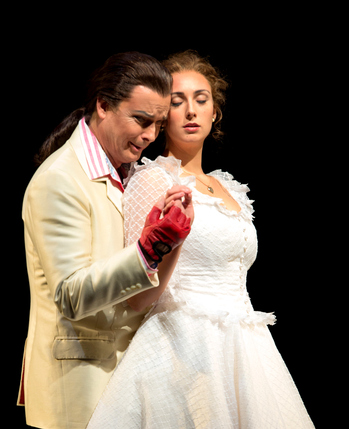Mozart's "Don Giovanni" is an opera almost 250 years old whose anti-hero exhibits reckless behavior and cynical indifference to real-world consequences. Updating the setting to 1936 Seville (the Don rides a motorcycle) doesn't change the opera's essentially timeless character; the Don remains personally charming yet morally reprehensible. A great plot, in other words.
 By the very nature of the beast, opera companies must schedule their seasons several years in advance, and Aidan Lang graciously acknowledges that this production of Don Giovanni's, the first on his watch as General Director, was not really his at all.
By the very nature of the beast, opera companies must schedule their seasons several years in advance, and Aidan Lang graciously acknowledges that this production of Don Giovanni's, the first on his watch as General Director, was not really his at all.
The current version, penciled into the Seattle Opera schedule three years ago, presented a most welcome solution to the company's financial restraints. No need to build, buy or rent new sets or costumes; they dusted off the 2007 production (minimalist sets by Robert A. Dahlstrom, costumes by Marie-Therese Cramer). Stage director Chris Alexander was brought back to rehearse the actors and tweak the staging. And aside from rising superstar tenor Lawrence Brownlee (a former Seattle Opera Young Artist), there was no need to hire expensive outside talent. The French bass-baritone Nicolas Cavallier, who portrayed all four of the menacing villains in last seasons "Tales of Hoffmann," was a natural for the suave, fast-talking Giovanni. The conductor, Gary Thor Wedow, had handled Mozart's "The Magic Flute" with great aplomb in 2011. No surprises, in other words. A perfect maiden voyage for Lang.
Above: Zerlina (Cecilia Hall) lets herself be seduced by Don Giovanni (Nicolas Cavallier). Seattle Opera photograph &ccopy; Elise Bakketun
The temptation is to conflate the political with the artistic. Politics is all about currently fashionable thought (or what the powerful feel everyone should think). And "Art," of course, is the opposite: it reflects the world but does not judge.
Ah, you say, one can despise Wagner's antisemitism yet love his music. Precisely.
Ah, you say, "The Death of Klinghoffer" is pro-Palestinian because it "humanizes" terrorists. The weekend papers are full of controversy about the Met's current staging of "Klinghoffer," which even allows 9/11-exploiter Rudy Giuliani to pretend that he "investigated" Klinghoffer's murder.
Ah, you say, "Don Giovanni" glorifies sexual aggression and puts a smile on domestic violence. Well, the National Football League has no grounds to complain. Cavallier's mellifluous Don is more Hollywood celebrity than NFL thug, a nasty sort of Charlie Sheen crossed with Robert Downey Jr., if you will.
And it would be wrong to think that Zerlina's plaintive "Batti, batti, bel Masetto" really means "Beat me, beat me." Quite the contrary. Zerlina is manipulating Masetto, not asking for trouble. Besides, has there ever been a lovelier piece of music ("La ci darem la mano") than the tune with which Don Giovanni seduces Zerlina?
As an opera, Don Giovanni is both tapestry and mystery, interweaving the familiar story of the libertine (over 2,000 conquests!) who, by tradition, must be punished, with the 18th Century's spirit of political Enlightenment (the rousing Act I "Long Live Liberty!" finale). As art, Mozart's collaboration with Lorenzo da Ponte transcends mere entertainment; it asks fundamental questions about good and evil, sex and personal responsibility. Seattle Opera's production enhances those mysteries with sublimely sung music. Even in today's nonjudgmental environment, that's a virtue.
My one quibble is the overly cute and cuddly hashtag the company has chosen: #mozartsbadboy. It trivializes Don Giovanni's criminally reckless behavior as well as Mozart's stern vision of his damnation. His real crime isn't his unbridled womanizing but his callous murder of the Commendatore. The tragedy is that the Don, unlike the other characters, is without a moral compass; he never sees past his own selfish sense of entitlement. Still, his double-down response, "That's who I am," (hashtag: canthelpmyself) wouldn't look nearly as good on the poster.
Leave a comment